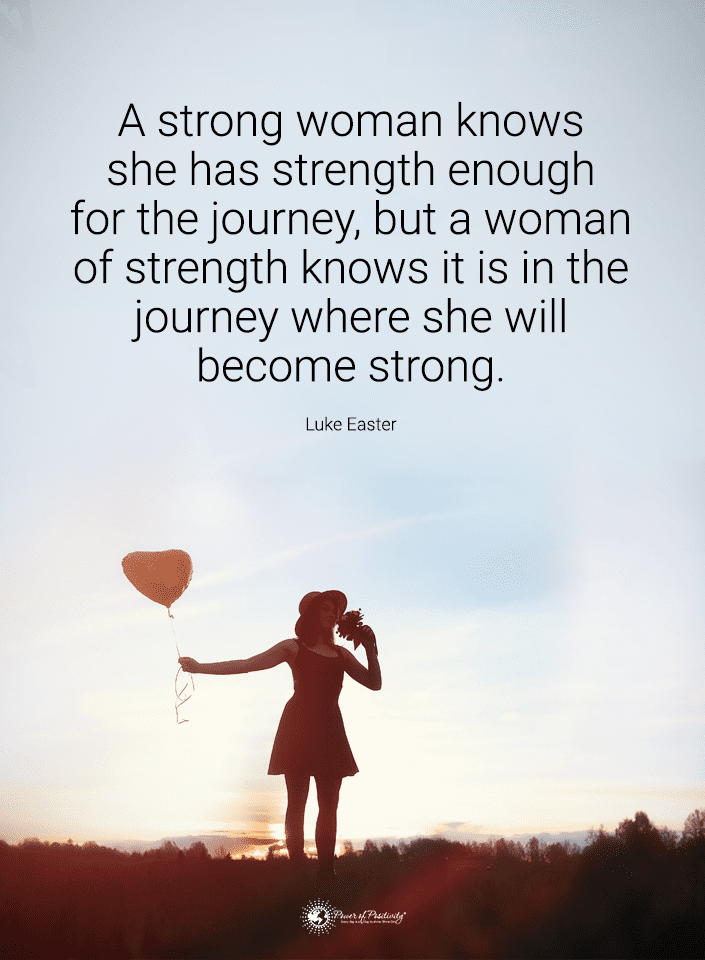Here’s what you need to know about loving a woman of great strength.
Have you ever found yourself in the challenging position of witnessing a strong woman you deeply care about decide to move on from your relationship? A one-way breakup is a scenario that can leave even the most composed individuals feeling uncertain and perplexed.
Yet, it’s crucial to understand that attempting to regain her affection is futile and fundamentally misguided when a strong woman decides to move on.
This article will explore the essence of a woman’s strength, understand why she may terminate a relationship, and assertively assert that trying to “win her back” may prove a fruitless endeavor. So, if you’ve ever grappled with these complexities or seek to deepen your comprehension of relationships and personal development, you’re in the right place. Prepare to gain invaluable insights as we embark on this journey together. Let’s proceed with clarity and authority.
Characteristics of a Strong Woman
Strength is often equated with physical prowess or dominance. But redefining what it truly means to be a strong woman is essential. Strength isn’t just about muscles or power plays; it’s about an unwavering inner fortitude that propels individuals forward in the face of adversity. So, what does this look like in practice?
She’s highly independent
First and foremost, a strong woman embodies independence. She doesn’t rely on others to define her worth or validate her existence. Instead, she forges her path, unapologetically pursuing her goals and dreams with determination and conviction. Whether climbing the corporate ladder, starting a business, or embarking on a solo adventure, she navigates life on her terms. She will chart a course that reflects her values and aspirations.
Her connections may be few, but they are solid
But independence isn’t synonymous with isolation. A strong woman knows the value of genuine connections and meaningful relationships. She cultivates a tribe of supportive friends and allies who uplift and empower her, but she isn’t afraid to stand alone when necessary. Her resilience is unparalleled, weathering life’s storms with grace and resilience. Setbacks are merely temporary setbacks, opportunities for growth and learning rather than insurmountable obstacles.
She is self-aware
Moreover, a strong woman possesses a deep sense of self-awareness. She knows who she is, what she wants, and what she deserves. This self-awareness allows her to set boundaries, prioritize her needs, and advocate for herself with confidence and poise. She doesn’t shy away from difficult conversations or uncomfortable truths; instead, she confronts them head-on, refusing to compromise her integrity or authenticity.
In a romantic relationship, these qualities take on even greater significance. A strong woman seeks a partner who respects but celebrates her independence and stands beside her as an equal rather than trying to control or diminish her light. She values mutual support and growth, recognizing that true partnership is built on respect, trust, and shared values.
So, if you find yourself in the presence of a strong woman, consider yourself fortunate. Embrace her independence, admire her resilience, and honor her self-awareness. And if you’re lucky enough to call her your partner, remember to cherish and nurture these qualities, for they are the essence of her strength and the foundation of your connection.
Reasons a Strong Woman Moves On
Navigating the complexities of romantic relationships can be akin to traversing a labyrinth filled with twists, turns, and unexpected challenges. For strong women, the decision to end a relationship is never taken lightly; it’s the culmination of careful reflection, introspection, and a deep commitment to their well-being and growth. So, what are some common reasons strong women may choose to move on from a relationship?
Lack of respect
One prevalent factor is the presence of a fundamental lack of mutual respect. In a healthy partnership, respect forms the basis for building trust, communication, and intimacy. However, the foundation begins to crumble when one or both partners consistently disregard each other’s boundaries, dismiss each other’s opinions, or belittle each other’s accomplishments. A strong woman recognizes that she deserves to be with someone who honors and values her for who she is without needing to diminish her worth or compromise her integrity. Lacking respect will lead to a breakup.
Values don’t align
Another catalyst for moving on is the discovery of incompatible values. While differences can often enrich a relationship, irreconcilable disparities in core beliefs, goals, or priorities can create insurmountable rifts. For example, finding common ground becomes increasingly challenging if one partner prioritizes family and stability while the other craves adventure and spontaneity. A strong woman understands the importance of alignment in values, recognizing that compromise shouldn’t come at the expense of her identity or happiness.
Drifting apart
Furthermore, personal growth can end a relationship. As individuals evolve and change over time, they may outgrow the dynamics of their current partnership. What once felt fulfilling and nourishing may now feel stifling or constraining. A strong woman embraces the journey of self-discovery and self-actualization, recognizing that staying in a relationship that no longer serves her growth and fulfillment would be a disservice to herself and her partner.
It is crucial to understand and accept these reasons without trying to undermine or invalidate them. Too often, individuals may attempt to guilt or manipulate their partners into staying in a relationship that has run its course. This not only disregards the autonomy and agency of the strong woman but also perpetuates a cycle of toxicity and resentment. Instead, it’s essential to approach the situation with empathy, compassion, and respect. Validate her feelings, acknowledge her reasons, and honor her decision, even if it’s difficult to hear. Relationships should have mutual understanding and support, not coercion or control.
By recognizing and respecting why strong women choose to move on from relationships, we create space for healing, growth, and transformation. It’s an opportunity to honor their autonomy, celebrate their strength, and cultivate healthier, more fulfilling connections in the future. So, if you ever find yourself in this situation, remember to approach it with empathy and grace, knowing that true love and fulfillment lie in honoring each other’s journeys, even when they diverge.
The Inability to Win Her Back
In the aftermath of a breakup, it’s not uncommon for individuals to experience a flood of emotions—grief, longing, and regret. It’s natural to want to turn back the hands of time, rewrite the narrative, and reclaim what once was. However, when it comes to a strong woman who has decided to move on, attempting to “win her back” is not just futile; it’s profoundly disrespectful.
First and foremost, let’s address the futility of such endeavors. A strong woman’s decision to end a relationship is rarely impulsive or erratic. It’s the culmination of careful consideration, introspection, and perhaps months or even years of silent contemplation. By the time she reaches this conclusion, she has likely exhausted all avenues for reconciliation and all possibilities for growth within the relationship. Thus, trying to “win her back” is akin to trying to revive a withered flower—it may temporarily bloom, but the roots have already withered, and the petals are destined to wilt once more.
Moreover, attempting to win back a strong woman after she has decided to move on is futile and a flagrant disregard for her agency and autonomy. When we ignore or dismiss her choice to prioritize her well-being and happiness, we diminish her worth as an individual. We reduce her to a mere object of desire, a conquest to be won, rather than a human being with her thoughts, feelings, and dreams.
Refusing to accept her decision will worsen matters
Furthermore, by refusing to accept her decision, we perpetuate a culture of entitlement and possessiveness that undermines the very foundation of healthy relationships. Love should never be coerced or demanded; it should be freely given and willingly received. When we try to manipulate or guilt-trip a strong woman into returning to a relationship she has outgrown, we strip away her autonomy, erode her self-esteem, and perpetuate a cycle of toxicity and codependency.
Ultimately, attempting to “win her back” after she has decided to move on is not an act of love; it’s an act of selfishness. It’s a refusal to acknowledge her agency, a refusal to respect her boundaries, and a refusal to honor her journey of self-discovery and self-actualization. Instead of fixating on the past, it’s time to embrace the present and the future—to let go with grace and dignity, knowing that true love and fulfillment lie in honoring each other’s paths, even when they diverge.
Self-Reflection and Personal Growth
It’s essential to reflect on the complexities of relationships, particularly those involving strong women. How do you perceive and treat strong partners in your life? Are you guilty of dismissing their autonomy or diminishing their worth? These questions may provoke discomfort but offer an invaluable opportunity for personal growth and self-improvement.
Examine your attitudes
First and foremost, consider your attitudes towards strength in a partner. Do you view it as an asset to be celebrated or a threat to be contained? Are you drawn to strong women but intimidated by their independence and resilience? Examining any biases or misconceptions about strength and femininity. Then, challenging yourself to embrace a more nuanced and inclusive perspective is essential.
Consider your behaviors
Furthermore, reflect on your behavior within relationships. Do you prioritize open communication and mutual respect? Or do you resort to manipulation and control? Are you willing to confront your insecurities and vulnerabilities, or do you project them onto your partner? Recognizing and addressing these patterns is a first step toward healthier. Thus, you may avoid another breakup later.
Did you support her?
Moreover, consider the impact of your actions on your partner’s autonomy and agency. Do you honor their choices and support their growth, or do you attempt to dictate their path and limit their freedom? Respecting your partner’s autonomy is crucial, recognizing that true love is rooted in mutual trust, understanding, and acceptance.
Embrace the opportunity for personal growth and self-improvement that comes from respecting the choices of others. When you prioritize empathy and respect in your relationships, you enrich your life and create a more nurturing and supportive environment for your partner to thrive. Remember, relationships are not about possession or control but connection, collaboration, and shared growth.
So, take this breakup to reflect on your behavior and attitudes towards relationships, particularly in how you perceive and treat strong partners. Embrace the journey of self-discovery and self-improvement, knowing that true fulfillment lies in honoring the autonomy and choices of others. You can create more meaningful and authentic connections built on mutual trust, appreciation, and love by cultivating empathy, respect, and understanding. By doing this hard work, you may avoid a future unwanted breakup.
Moving Forward with Grace After a Breakup
Navigating the aftermath of a breakup can be fraught with emotional upheaval and uncertainty. Yet, it’s essential to approach this transition with grace and resilience, honoring both yourself and your former partner in the process. So, how can you move forward with dignity and integrity after a relationship with a strong woman ends?
First and foremost, allow yourself the space to grieve. It’s natural to feel a whirlwind of emotions—sadness, anger, confusion—as you come to terms with the end of a significant chapter in your life. Permit yourself to experience these feelings fully, without judgment or self-criticism. Lean on your support network—friends, family, or a therapist—to process your emotions and gain perspective.
As you navigate this period of transition, prioritize self-care and personal growth. Take time to nourish your mind, body, and soul, whether practicing mindfulness meditation or reconnecting with friends. Focus on cultivating a strong sense of self and rediscovering your passions and priorities outside the relationship.
Furthermore, maintain clear boundaries with your former partner. While it’s natural to want closure or reconciliation, respecting each other’s need for space and healing is essential. Avoid engaging in behaviors that may prolong the pain or reopen old wounds, such as stalking their social media or seeking out contact when it’s not welcomed. Instead, focus on your journey of self-discovery and growth, trusting that time will bring clarity and perspective.
Above all, approach this transition period with compassion and empathy for yourself after a breakup. Recognize that endings can also be beginnings, opportunities for growth, and transformation. By honoring the lessons learned and the memories shared, you can release the past with gratitude and embrace the future with open arms.
Final Thoughts on a Breakup With a Strong Woman
Losing a strong woman is not just about the end of a partnership. Instead, the breakup could be an opportunity for profound self-discovery and personal transformation. It’s a chance to redefine your priorities, reassess your values, and cultivate a deeper understanding of yourself and your relationship needs.
Remember, the end of a relationship does not reflect your worth or value as a person. It’s a natural part of the human experience, offering opportunities for growth, resilience, and newfound wisdom. Embrace this opportunity to honor the shared journey, lessons learned, and cherished memories.
Moving forward, carry the lessons from this experience—embrace your strength, cultivate resilience, and prioritize self-care and personal growth. Approach future relationships with empathy, compassion, and a deep appreciation for the autonomy and agency of your partners.
















 Community
Community

